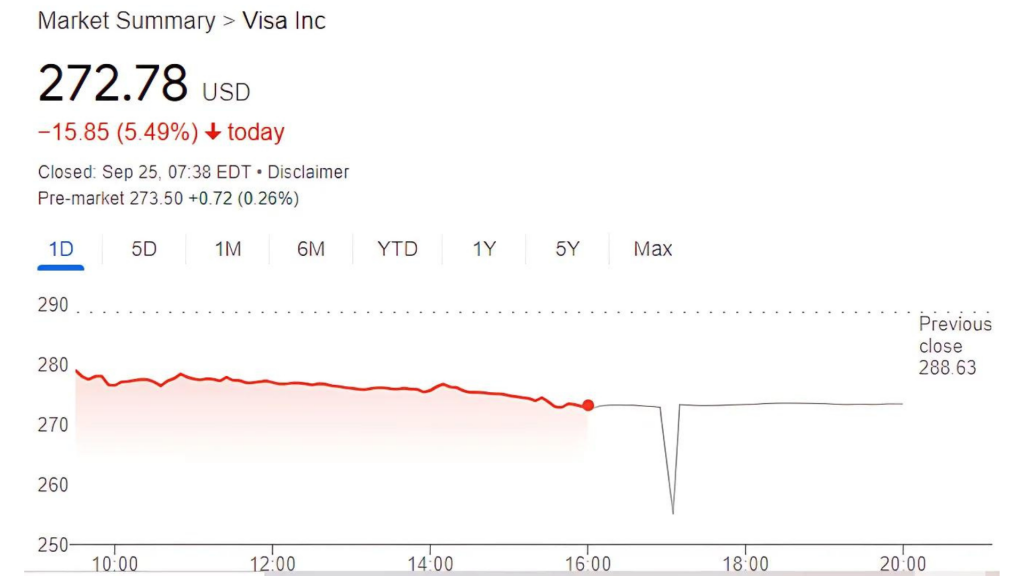On Tuesday, the U.S. Department of Justice filed a lawsuit accusing Visa, one of the world’s largest payment networks, of violating antitrust law by suppressing competition through tactics such as imposing high fees on merchants and paying off potential rivals. While Visa has faced scrutiny before, the depth of these allegations—claiming monopolistic control over the U.S. debit card market—compels Wall Street investors to reassess the company’s future and the overall milieu for payment networks.
The lawsuit represents a significant chapter in the ongoing debate surrounding Visa’s business practices. The Department of Justice (DOJ) accuses Visa of exploiting its dominance by imposing restrictive agreements on merchants, banks, and competitors. These agreements compel businesses to route a substantial portion of their transactions through Visa’s network, effectively sidelining alternative payment methods. As a result, Visa’s dominance translates to over $7 billion in annual fees from U.S. debit transactions alone, according to DOJ estimates.
This antitrust suit reflects ongoing concerns about Visa’s market power. Critics argue that the company systematically exploits its dominant position to suppress innovation and stifle competition.
“We allege that Visa has unlawfully amassed the power to extract fees that far exceed what it could charge in a competitive market,” US attorney-general Merrick Garland said.
The DOJ’s complaint has highlighted Visa’s agreements with major tech firms, such as Apple, PayPal, and Block (formerly Square), where Visa allegedly compensated these companies to refrain from launching products that could challenge its dominance. Such conduct has broader implications not only for Visa’s financial performance but also for the payment industry as a whole, where rising consumer prices often stem from monopolistic behavior.
In response, Visa’s General Counsel Julie Rottenberg argued that competition is thriving in the debit market and dismissed the lawsuit’s claims as ‘meritless’.
“Anyone who has bought something online, or checked out at a store, knows there is an ever-expanding universe of companies offering new ways to pay for goods and services,” Rottenberg said in a statement. She further said that, when businesses and consumers choose Visa, it is because of our secure and reliable network, world-class fraud protection, and the value we provide.
However, Wall Street has not responded positively to these reassurances. After the lawsuit was filed, Visa’s stock fell by 5.5%, showing clear concern among investors about the potential consequences.

This level of investor concern is not unfounded. In the past, antitrust cases in the U.S. often lead to long-term consequences, even if they take years to resolve. A similar case in 2019 resulted in Visa and Mastercard agreeing to pay $5.6 billion to U.S. merchants to settle claims of anti-competitive practices. This year, a federal judge in Brooklyn rejected [Source: PDF] a settlement that would have further cut fees by about $30 billion over five years. These amounts illustrate the potential financial burdens that Visa could face, which may impact shareholder value.
Market analysts have already begun to downgrade Visa in the wake of this Sept. 24 lawsuit.
Citi analyst Andrew Schmidt said that while Visa might have reasonable arguments for ramping up debit market competitiveness, the lawsuit introduces an incremental regulatory overhang.
“However, there is likely to be an incremental regulatory overhang for (Visa), and developments may stretch out with variable outcomes,” Schmidt wrote in a note to clients Tuesday morning, ahead of the official filing.
This uncertainty is driving analysts to shift their preference toward Mastercard, which, although also facing regulatory scrutiny, appears to be in a more favorable position at this stage.
Monness Crespi Hardt analyst Gus Galá echoed similar concerns, reiterating a Neutral rating on Visa’s stock and warning that the legal proceedings could stretch out over a prolonged period.
“We believe this is an immediate negative to shares but we caution these types of anti-trust cases are notoriously known for long/winding paths in the U.S.,” he wrote.
The broader market impact is also worth noting.
Mastercard’s stock fell 2.5% alongside Visa’s decline, signaling that investors are beginning to view the entire payment sector with a more cautious lens. The ripple effects of Visa’s legal woes are likely to extend beyond its stock performance.
One important factor driving this lawsuit is the increasing competition in the payments industry. While Visa and Mastercard once dominated the market, new players are quickly gaining ground. The Federal Reserve’s real-time payment service, FedNow, is one such alternative. With over 900 financial institutions signed up, FedNow allows businesses and consumers to bypass traditional card networks and make payments directly from their bank accounts.
Walmart’s recent partnership with Fiserv to enable direct bank payments further challenges Visa’s dominance. Although the immediate effect of Walmart’s strategy may be small, it demonstrate the growing importance of pay-by-bank solutions, which could pose a significant risk to Visa. This changing competitive environment may indicate that Visa’s hold on the market is weakening.
The Justice Department’s attention on Visa’s debit business, according to Mizuho analyst Dan Dolev, is not surprising but still raises concerns. “The difference between then and now is you’ve got alternatives to debit,” Dolev said.
Visa’s efforts to acquire fintech companies like Plaid, which the DOJ blocked in 2021, evidently show the extent to which Visa has tried to maintain its market dominance. The lawsuit has now brought Visa’s acquisition strategies back into focus, increasing pressure on the company to defend its practices in court.
The impact of this lawsuit goes well beyond Visa’s immediate stock performance. The DOJ’s allegations against Visa are part of a larger effort by the Biden administration to address monopolistic practices. This administration has taken a more active approach to antitrust issues than previous ones, aiming to create a more competitive market that benefits consumers. US Attorney General Merrick Garland’s statement that Visa’s illegal actions affect “the price of nearly everything” serves as a strong reminder of how widespread these monopolistic practices can be.
“Merchants and banks pass along those costs to consumers, either by raising prices or reducing quality or service. As a result, Visa’s unlawful conduct affects not just the price of one thing – but the price of nearly everything,” Garland said.
However, Visa’s defense is strong as well. The company has claimed that the debit payments market is healthy and that various alternative payment methods are readily available. Visa’s agreements with technology firms, according to Rottenberg, are vital for building secure and trustworthy payment networks for consumers and businesses. “Today’s lawsuit ignores the reality that Visa is just one of many competitors in a debit space that is growing, with entrants who are thriving,” Rottenberg said.
Still, the notion that Visa is just one of many competitors in a growing debit market may not persuade regulators or investors, especially with the rise of new technologies.
As the case develops, Wall Street will closely monitor how this lawsuit might change the payment environment. Although Visa has handled regulatory scrutiny successfully in the past, this lawsuit could have significant effects, especially if the DOJ proves its case. Investors are already considering the possibility of a lengthy legal process, with potential settlements or penalties likely to impact Visa’s profits.
For Visa, the challenge is not only to defend itself against these allegations but also to adjust to a rapidly changing payments landscape. The growth of real-time payments, blockchain technologies, and direct bank transfers indicates that Visa’s traditional business model may need to adapt. The lawsuit acts as a wake-up call not just for Visa but for the entire payment industry.
Visa’s ability to defend itself is crucial for its future success. However, this lawsuit sends an important message to Wall Street: the payment landscape is changing, and companies that do not adapt may face unforeseen challenges in this competitive market.








